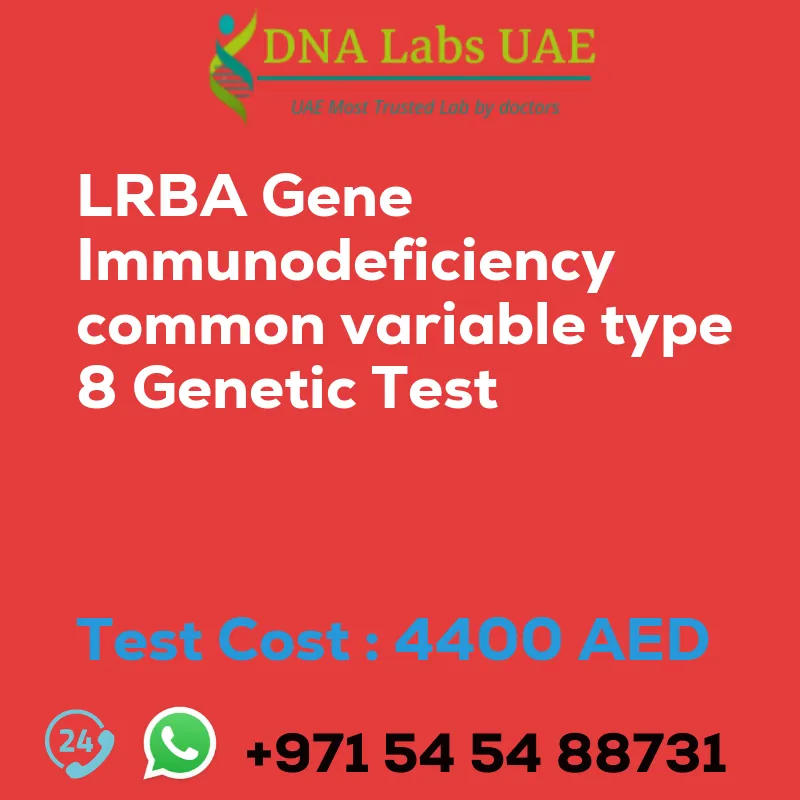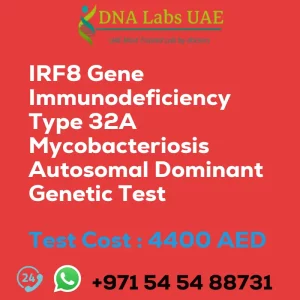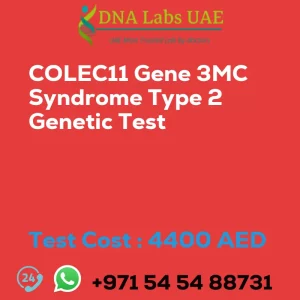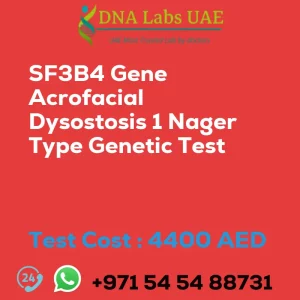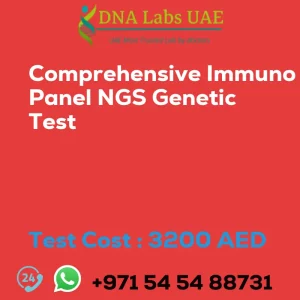LRBA Gene Immunodeficiency common variable type 8 Genetic Test
Components: LRBA Gene Immunodeficiency common variable type 8 Genetic Test
Price: 4400.0 AED
Sample Condition: Blood or Extracted DNA or One drop Blood on FTA Card
Report Delivery: 3 to 4 Weeks
Method: NGS Technology
Test Type: Osteology Dermatology Immunology Disorders
Doctor: Dermatologist
Test Department: Genetics
Pre Test Information: Clinical History of Patient who is going for LRBA Gene Immunodeficiency common variable type 8 NGS Genetic DNA Test. A Genetic Counselling session to draw a pedigree chart of family members affected with LRBA Gene Immunodeficiency common variable type 8 NGS Genetic DNA Test gene LRBA
Test Details: The LRBA gene is associated with a rare immunodeficiency disorder called common variable immunodeficiency type 8 (CVID8). CVID8 is characterized by a defect in the LRBA gene, which leads to impaired immune system function and recurrent infections. NGS (Next-Generation Sequencing) genetic testing is a method used to analyze the DNA sequence of genes, including the LRBA gene, to identify any mutations or abnormalities that may be present. This type of testing can help diagnose CVID8 and provide information about the specific genetic mutation causing the disorder. NGS genetic testing for LRBA gene immunodeficiency involves collecting a DNA sample, typically through a blood or saliva sample, and analyzing the DNA sequence using advanced sequencing technology. The test can detect various types of genetic mutations in the LRBA gene, including point mutations, insertions, deletions, and gene rearrangements. By identifying the specific genetic mutation in the LRBA gene, NGS genetic testing can help guide treatment decisions and provide information about the inheritance pattern of the disorder. It can also be used for carrier testing and prenatal diagnosis in families with a history of CVID8. It is important to consult with a healthcare professional or genetic counselor to determine if NGS genetic testing for LRBA gene immunodeficiency is appropriate and to understand the implications of the test results.
| Test Name | LRBA Gene Immunodeficiency common variable type 8 Genetic Test |
|---|---|
| Components | |
| Price | 4400.0 AED |
| Sample Condition | Blood or Extracted DNA or One drop Blood on FTA Card |
| Report Delivery | 3 to 4 Weeks |
| Method | NGS Technology |
| Test type | Osteology Dermatology Immunology Disorders |
| Doctor | Dermatologist |
| Test Department: | Genetics |
| Pre Test Information | Clinical History of Patient who is going for LRBA Gene Immunodeficiency common variable type 8 NGS Genetic DNA Test. A Genetic Counselling session to draw a pedigree chart of family members affected with LRBA Gene Immunodeficiency common variable type 8 NGS Genetic DNA Test gene LRBA |
| Test Details |
The LRBA gene is associated with a rare immunodeficiency disorder called common variable immunodeficiency type 8 (CVID8). CVID8 is characterized by a defect in the LRBA gene, which leads to impaired immune system function and recurrent infections. NGS (Next-Generation Sequencing) genetic testing is a method used to analyze the DNA sequence of genes, including the LRBA gene, to identify any mutations or abnormalities that may be present. This type of testing can help diagnose CVID8 and provide information about the specific genetic mutation causing the disorder. NGS genetic testing for LRBA gene immunodeficiency involves collecting a DNA sample, typically through a blood or saliva sample, and analyzing the DNA sequence using advanced sequencing technology. The test can detect various types of genetic mutations in the LRBA gene, including point mutations, insertions, deletions, and gene rearrangements. By identifying the specific genetic mutation in the LRBA gene, NGS genetic testing can help guide treatment decisions and provide information about the inheritance pattern of the disorder. It can also be used for carrier testing and prenatal diagnosis in families with a history of CVID8. It is important to consult with a healthcare professional or genetic counselor to determine if NGS genetic testing for LRBA gene immunodeficiency is appropriate and to understand the implications of the test results. |

